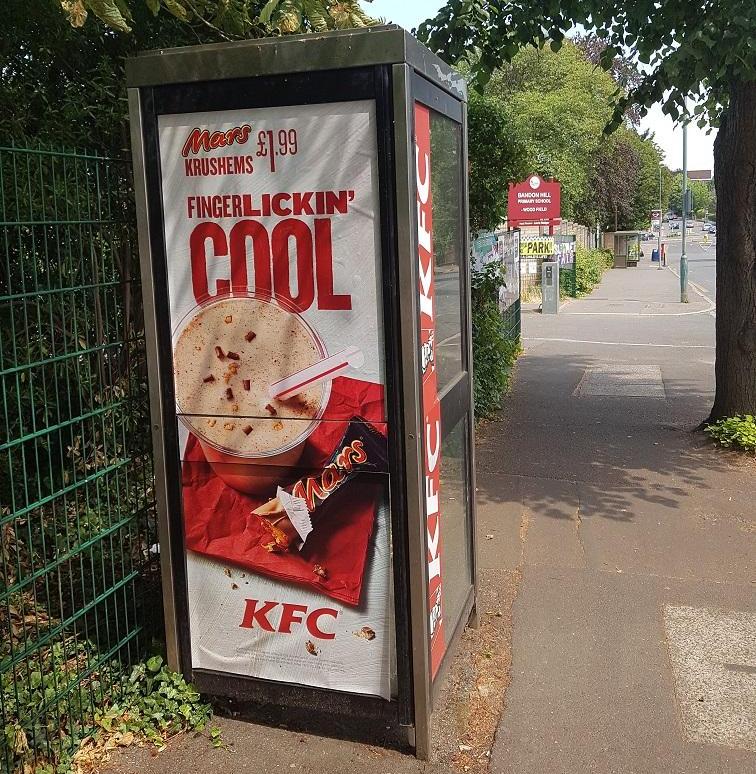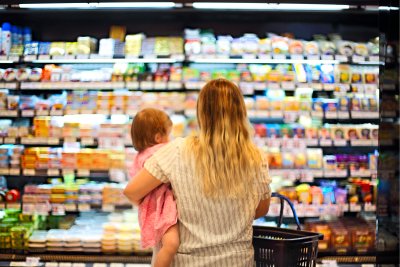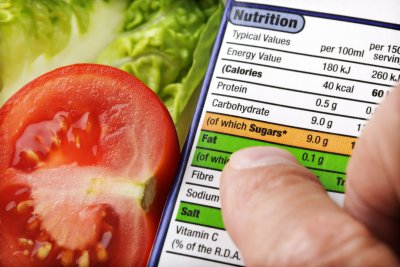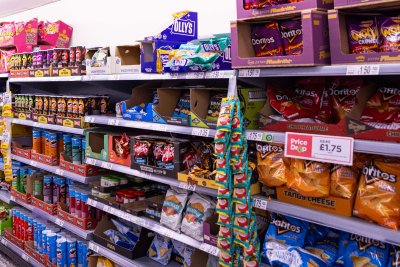

Advertising Standards Authority bans KFC and Kellogg’s adverts from targeting children
The Advertising Standards Authority has upheld complaints against a KFC 'Mars Krushem' milkshake outside a primary school and a TV ad for Kellogg's Coco Pops shown on a children's channel, but rules aimed at protecting kids from junk food marketing are still not strong enough, say health campaigners.
The Advertising Standards Authority (ASA) has upheld complaints against two brands for adverts for unhealthy food clearly aimed at children.
The complaints, submitted by the Obesity Health Alliance (OHA) and Children’s Food Campaign (CFC), include:
- An advert for a KFC ‘Mars Krushem’ milkshake drink placed in a phone box directly outside a primary school. This fell foul of the Committee of Advertising Practice (CAP) code rule which states that adverts from products high in fat, sugar and salt (HFSS) should not be placed in areas where the audience is likely to be disproportionally made up of children.
- An advert for ‘Coco Pops Granola Cereal’ shown on a children’s TV channel. The product advertised is not classed as an HFSS product. However OHA argued that the advert had the effect of promoting Coco Pops cereal due to the use of branding and the character Coco the Monkey which is highly associated with the original Coco Pops cereal.
Commenting on the rulings, the Children’s Food Campaign co-ordinator Barbara Crowther said:
“We are pleased these complaints have been upheld, but they are the tip of the iceberg when it comes to non-compliance with the rules. We know at least seven other complaints about fast food and confectionery ads on bus stops and telephone boxes next to schools have been submitted to the ASA. This indicates that brands are simply flouting the rules, hoping no-one will bother to complain, and safe in the knowledge there are no meaningful sanctions for non-compliance anyway.
Children’s exposure to junk food marketing should not be dependent on organisations and members of the public lodging ad-hoc complaints. Clear guidance about what constitutes an HFSS advert and a stronger legislative framework to restrict junk food marketing are needed if we are to adequately protect children from obesity.”
Commenting on the rulings, Caroline Cerny, Alliance Lead at the Obesity Health Alliance said:
“The ruling on Coco Pops Granola provides an important precedent for junk food marketing. These adverts are designed specifically to appeal to children with fun cartoon characters and catchy jingles. This ruling recognises that, even though the product shown is classified as ‘healthier’, the advert used all the same features as adverts for original Coco Pops cereal and therefore essentially promoted the ‘less healthy’ product, which is not acceptable. We are very supportive of brands reformulating their products to reduce sugar and overall calories, but they must market them responsibly.
This is just another example of the ever evolving tricks brands use to get their products in front of children and why we need stronger, regulatory protection online and with a 9pm watershed on junk food adverts on TV.”
Meanwhile, the ASA has rejected a complaint relating to McDonald's advertising on the back of bus tickets, because the promotion fell below the minimum 25% child audience threshold, which has already been challenged by the Children's Food Campaign who say this can still result in too many children being exposed to such advertising. It also rejected a complaint about a Happy Meal advert which played between episodes of Peppa Pig and featured popular children's cartoon characters from Pokemon, because the specific Happy Meal choices featured chicken nuggets, pineapple and water, rather than other items on the menu. In response to the ASA ruling on McDonalds, Barbara Crowther said:
“We welcome the fact that McDonald’s are actively promoting the healthier options available on the Happy Meals menu, which is why ASA rejected this complaint, and we encourage them to go all the way to take the remaining high fat and sugar products off it altogether.
But let’s be clear, if Pokémon, Pikachu and friends are successful in getting kids into the café for their Happy Meal, they can still order a cheeseburger, fries and a small strawberry milkshake, which would be a whopping 738 calories, including 37.7g sugar, more than they should eat in an entire day, let alone one meal.
Parents tell us that consistent use of children’s favourite cartoon characters hugely increases pester power to buy the associated products. It’s the whole Happy Meal experience with its associated toys they’re asking for, not necessarily items featured in the ad. McDonald’s own evidence is clear that the most popular Happy Meal option rarely includes the pineapple and water advertised.”
The recently published “Chapter 2” of the Government’s Childhood Obesity Plan includes an intention to introduce a 9pm watershed on junk food adverts on TV, with a similar level of protection applied online. The plan also makes a commitment to consider whether the current self-regulatory approach to advertising rules provides protection to children from HFSS marketing. Members of the OHA and Children’s Food Campaign support further legislative protection in this area, to ensure that restrictions are effective and enforced. The OHA & Children’s Food Campaign are both calling on CAP, as part of its current review of advertising guidelines, to close loopholes and prevent companies from running brand marketing campaigns that essentially still have the effect of promoting unhealthy foods.
Children's Food Campaign: Campaigning for policy changes so that all children can easily eat sustainable and healthy food.
Sustain
The Green House
244-254 Cambridge Heath Road
London E2 9DA
020 3559 6777
sustain@sustainweb.org
Sustain advocates food and agriculture policies and practices that enhance the health and welfare of people and animals, improve the working and living environment, promote equity and enrich society and culture.
© Sustain 2026
Registered charity (no. 1018643)
Data privacy & cookies
Icons by Icons8







